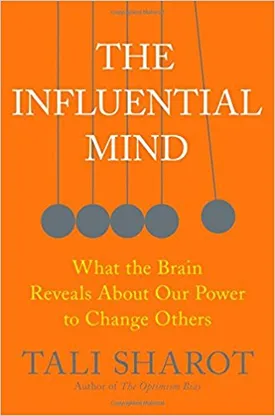The Influential Mind: What the Brain Reveals About Our Power to Change Others by Tali Sharot
The Influential Mind, written by Tali Sharot, explores the workings of the human brain and its incredible capacity to influence and shape our decisions. Through her writing, Sharot looks at the psychology of influence and how it depends on an understanding of the brain’s wiring and inscrutable depths. By delving deep into the neurological implications of influence, Sharot reveals how we can change the minds of others — and ourselves — for the better.
In The Influential Mind, Sharot looks at a number of groundbreaking studies that have proven not only the powerful techniques of persuasion, but also the human brain’s capacity to be influenced and even manipulated. She looks at the neuroscience of persuasion — from the impact of emotion on decision-making processes to the role of expectations, from the physiological influences of stress on choices to the implications of an individual’s values — and how each of these factors interact to shape our choices.
Sharot also investigates the neuroscience of trust, exploring the intricate relationship between trust and influence. She looks at how trust can be measured, understanding how and why we perceive our influence as greater than it actually is. By considering the psychology of trust and its power to influence, Sharot provides valuable insights into how we can cultivate more meaningful relationships, build trust, and ultimately use it as a form of power to motivate and bring effective changes.
Drawing on the latest research in neuroscience, The Influential Mind provides readers with the understanding they need to appeal to the minds of others. By gaining this knowledge, we gain insight into both our own brains and those of others, enabling us to effectively seek out the positive changes we desire. Moreover, Sharot provides an in-depth look at the brain’s emotional circuitry, exploring how certain techniques can be employed to change our emotional responses to stimuli.
In The Influential Mind, Sharot helps us better understand the complex mechanisms behind the power of influence, and how these tools can be used to bring about positive change in the world. By exploring the neurological implications of influence, Sharot argues that a greater understanding of the brain’s communication systems and emotional circuitry can enable us to exert greater influence over those around us. Through this exploration of the workings of the human brain, Sharot provides readers with the tools they need to become more effective influencers, communicating effectively with those around them and being persuasive in a meaningful way.

